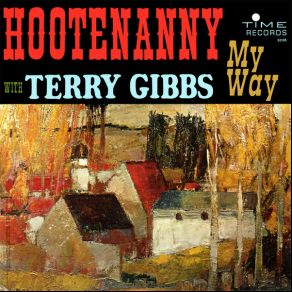Hootenanny My Way
Download links and information about Hootenanny My Way by Terry Gibbs. This album was released in 1963 and it belongs to Jazz, Latin, Bop genres. It contains 10 tracks with total duration of 40:26 minutes.

|
|
|---|---|
| Artist: | Terry Gibbs |
| Release date: | 1963 |
| Genre: | Jazz, Latin, Bop |
| Tracks: | 10 |
| Duration: | 40:26 |
| Buy it NOW at: | |
| Buy on iTunes $9.90 | |
| Buy on Amazon $4.59 | |
| Buy on Songswave €1.15 | |
Tracks
[Edit]| No. | Title | Length |
|---|---|---|
| 1. | Joshua | 3:22 |
| 2. | John Henry | 3:20 |
| 3. | When Johnny Comes Marching Home Again | 4:18 |
| 4. | Michael, Row The Boat Ashore | 4:18 |
| 5. | Polly Wolly Doodle All Day | 2:50 |
| 6. | Tom Dooley | 4:23 |
| 7. | Greensleeves | 4:04 |
| 8. | Boll Weevil | 5:47 |
| 9. | Down By The Riverside | 4:13 |
| 10. | Sam Hall | 3:51 |
Details
[Edit]This album by vibraphonist Terry Gibbs has a reputation for being a long-lost fusion of country & western and jazz, and one of the very few recordings of that nature in existence. Most likely this derives from the fact that it has been out of print for many years and very few listeners have even heard it. From the look of things it seems like it could be one of the strangest jazz albums of all time. For example, here we have cover versions of songs such as "Polly Wolly Doodle All the Day," with Alice Coltrane on piano! This was before she tied the marital knot with John Coltrane, so she's identified as Alice McLeod here. That song title should give a good indication of what the group is up to here, and it certainly isn't country & western by any stretch of the imagination. The public can be forgiven, perhaps praised, for forgetting just exactly what a hootenanny is, but this album stems from an era when one of the most popular shows on television was Sing Along With Mitch. This Mitch Miller production was your typical hootenanny, i.e., everyone gets together and sings folk songs that everyone knows. This is the type of material that is done here, although the basic themes of songs such as "When Johnny Comes Marching Home" and "Down By the Riverside" are reharmonized and jazzed up, often with extra bebop riffs thrown in. This, combined with the completely straight-ahead nature of the improvised playing, means this ends up sounding pretty much like an ordinary jazz record. "Tom Dooley," for example, is treated to key modulations within the theme as well as an alteration of the melody, and the result is that it sounds like any number of hard bop heads from this period. The group gets the jump on Coltrane by doing a jazz version of "Greensleeves," which is quite nice. Gibbs, of course, is a proficient soloist and does very well in this setting. The pianist hadn't developed her flowing, mid-Eastern-influenced style yet, so her playing is much more mainstream here. This is a cool, swinging session, and there is certainly nothing wrong with it, although anyone expecting to be shocked by some strange form of "hootenanny jazz" will be disappointed.